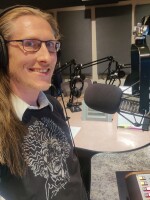The city of Albuquerque’s Human Rights Board has been operating for 50 years, but you’d be forgiven if you didn’t know it exists.
Now, the board has been working to change that by increasing its activity and presence in the city.
At the end of last month the board hosted a public hearing to gather input and testimony on violence and discrimination against the unhoused.
Board Chair Anami Dass went looking for the last time the board held a similar meeting and the only evidence she could find was one in January of 1975, about discrimination in credit reporting.
And the board has done much more in recent months, including passing a resolution officially calling for a ceasefire in Gaza.
In May, the City Council amended the Human Rights Ordinance to include pregnancy, disability, sexual orientation and gender identity as protected groups based on the work of the Human Rights Board.
Dass said that particular work was personal to her.
“No one left a comment about that,” she said “I just showed up, and I was a trans woman, and I would like rights, please.”
Board Vice Chair Jack Champagne said Dass has been a big reason why the board has suddenly become more active.
“She is kind of taking the opportunity to lead the board in a more activist role of basically taking the reins in the city's approach to civil rights,” he said.
Board member Larry Hinojos also gives kudos to Dass. But he also thinks the board is simply more necessary in today’s world than it has been before. Not only has there been an increase in the unhoused population, but there are more issues with civil rights, and renters’ rights, for example.
“During Covid, we were getting a lot of calls of property managers or owners who were getting the funding from the federal government and then kicking the people out,” Hinojos said. “And then there was no recourse. There wasn't anybody regulating that. because they had no voice, right? They could not afford a lawyer.”
During the hearing last month about housing issues, Bonnie Reeders gave testimony saying she had dealt with that exact issue, and it’s how she first became homeless, even though her landlord told her she had been approved for emergency rental assistance.

“He knocked on my door and three other people's doors, that he had do the application, and said you got approved for so much and your back rent is cleared, and you're cleared for six months, and we still got evicted,” Reeders said.
The board comes together once a month for regular meetings and serves two main functions for the city – acting as the deciding body for discrimination complaints filed with the city’s Office of Civil Rights, and advising the Mayor and the City Council on matters of human rights.
The hearing last month was an example of that advisory duty. When the board has a regular meeting, they discuss any issues that have been placed on the agenda by the chair, or suggested by other board members, and also take public comments.
“So people can come in and suggest their ideas, suggest their recommendations or their concerns,” Dass said.“And the board can see if we feel like taking those further than just a public comment. And that's what happened with the homeless rights stuff.”
Dass said after two public commenters mentioned a rise in discrimination against the unhoused population, the board decided to do some research and hold a hearing.
She said after a hearing like that, they have 30 days to complete a report, which is then presented to the city’s government. In this case she says the board will suggest updating the city’s hate crime ordinance to include housing status, among other statuses, as protected.
“It's not just for people experiencing homelessness. It's for veterans and trans people, people over the age of 60,” she said. ”The city ordinance is missing a lot, and it would be nice to see us at least match the state and hopefully go above and beyond and protect our veterans and our most vulnerable.”
The board is composed of volunteers who receive no compensation for their work. But Dass said everyone on the board is passionate about human rights, with most having lived experience with some sort of discrimination or hardship. Dass says she has been homeless herself, as has Champagne.
Champagne said that experience helps them provide the best advice possible to the city’s top politicians.
“Having that sort of worm's eye view of homelessness in the city kind of helps both motivate and understand the scope of the problem,” he said
And the board doesn’t plan on slowing down anytime soon.
Champagne said he would like to do more work promoting racial equality with Albuquerque’s Black population. Hinojos said he wants to do more work with Hispanic and Native American populations, and hopefully provide some sort of advocacy position that can be a point of contact for marginalized communities. Dass wants to bring back the city’s Human Rights Awards, which the board offered and curated for over a decade starting in 1990.
“There was also a scholarship, and I think that's really exciting. I like the idea of administering a scholarship,” she said. “So I've been meeting with a few organizations about potentially offering that service again.”
For now, the board is finalizing its report on violence and discrimination against the unhoused at its next meeting, and will present it to the city on Monday.
The board's next general meeting will take place Thursday at 5 p.m. in the Albuquerque City Council Chambers, at 1 Civic Plaza, Albuquerque, 87102.
Support for this coverage comes from the W.K. Kellogg Foundation





